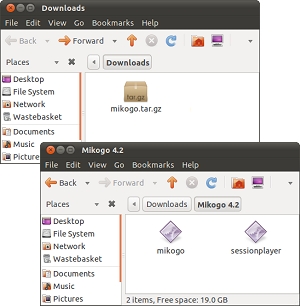6 Things Windows Users Should Know Before Switching to Linux
I myself am a new Linux user, after switching over my laptop to Ubuntu 11.10 a few months back. I still use Windows regularly as well; however, I can honestly say that I enjoy myself when using Ubuntu too. I can’t say that Linux is recommended for everybody. I can’t promise that you will be happy if you switch. In fact, I think it takes a special kind of person and mindset to truly appreciate Linux. It’s just very different from anything you’ve used before. It took me a couple of hours to get a rough grip when I made the Windows to Macintosh transition for some projects. It’s been months that I’ve been using Ubuntu regularly and I’m still learning.
I can offer some assistance though if you’re thinking about switching a computer of yours over to Linux, or more specifically, Ubuntu, which is the most widely used spin-off OS for the open source system. I can definitely say that I wish I had a list like this when I switched over. It can be a bit scary when you find yourself in an unfamiliar desktop environment, and I hope that this helps you get your bearings a bit faster.
1. Support is… different.
When you have an issue with your Windows operating system, you give Microsoft a phone call and talk to a representative. It’s arguable as to how competent these employees actually are, but either way it’s relatively fast and you can say pretty much anything you want because you paid for the OS and therefore have a RIGHT to demand help.
Things are different for Linux. Although forms of it like Ubuntu (which I would recommend if it’s your first time using Linux as it is probably the easiest transition) have very active support communities, you’re going to need to be respectful and patient if you want to accomplish anything with them. These people are all volunteers and have their own lives. If it takes them a while to respond, you need to understand that. The help is there for free of charge, but make sure you aren’t expecting to be talking to a company, but an individual.

2. Your drivers may not work.
This truly is something vital, because if you don’t look into before switching you can really be out of luck. If you are a Windows user that owns an iPod touch and switch to Linux, you’d better have a second computer lying about because Linux can’t help you. You can still play your mp3 files and such, but you won’t be able to sync or purchase music from the iTunes store. iPods were the primary example, but make sure just about anything important has a Linux driver as well. If you don’t have a second computer like I mentioned above, then it may be best to either run Linux dual-booting with Windows or Macintosh.

3. Your mainstream games are nonexistent here.
There are plenty of games to play on Linux, many of which are ported from Windows. A lot of games are actually free. However, if you’re an active PC gamer then it’s not recommend that you go all-out Linux. Games like Doom 3, Quake 4, Civilization, World of Goo, are all very popular and can be played. But don’t expect to be able to play massive mainstream games like Call of Duty or the Elder Scrolls. More and more games are being made and ported onto the operating system, but generally it isn’t new games. Usually the games on Linux are made by indie developers, though bigger companies like id software and Loki are known for quite a few ports.
4. You no longer have to worry about viruses.
Well… not as much anyway. The fact of the matter is, whether you are on a Windows, Mac, or Linux, Android, iOS, etc. there is always a risk of getting some sort of malware. However, the odds of getting one on Linux are greatly reduced if you’re coming from Windows. Most malware is coded to hurt a Windows system since the majority of internet-connected peoples are on a Windows computer. But that’s not all- Linux has special security encoded right into its system files. More importantly, it believes in an entirely different style of protecting users.
In Windows, your conventional anti-virus software essentially works by having a database of suspicious files and behaviors. It then uses this database of information to monitor what you’ve got on your computer. It’s more complicated than that but that’s the picture of it working ideally. However, there are obviously a couple of obvious and fatal flaws which are exploited frequently on the operating system. With all of the new viruses and security flaws found, viruses continue to be made every day, which means constant updates for the anti-virus to keep you safe. That means system resources.
Linux and its forms of security work in a different way. Basically it’s the equivalent of having a whitelist antivirus on Windows and works entirely the opposite. Instead of having a huge database of stuff that’s bad, a whitelist antivirus keeps a small database of stuff that’s good. Linux implements this into its system by having the user create a super-master-administration password when you first install the OS. This password is basically untraceable in the system kernel and as far as I’m aware there is no possible way to extract it with the current version of Ubuntu. Every time a program goes to change something on your Linux system you have to authorize it yourself. And let’s say you run into a rare Linux virus and authorize it by accidentally authorize it to do whatever it may to screw up your computer (an unlikely scenario, but one to quell the concerns of the “what-if” people out there.) You can just as easily stop this malware by entering your authorization password.
Oh… and if all that still isn’t enough it’s also possible to get big-name AVG anti-virus on Ubuntu.
5. Installing software is easier/harder?
I know this may seem obvious to some, but for me it was actually a big surprise to see when I finally installed Ubuntu. After downloading a couple of programs from the Ubuntu Software Center (which is extremely easy to use) I decided I wanted to try and install something else that wasn’t featured in the center. I found a download link and started downloading, not really paying attention. When I went to my downloads folder I was created with an extension of “.tar.gz”. I soon found that this is sort of like a .zip or a .rar, so no real big deal there. I then found though that there was no .exe for me to double click and then spam click the “next” button through. Instead, for some software, you’re required to install it yourself using a code in the Linux terminal. The code has some sort of logical order to it but for someone new, it definitely felt intimidating. Linux does indeed have some sort of installer in some cases but usually the only times you’ll find them is with something that could already be installed via the Ubuntu software center.

6. There’s lots of free to be had.
This isn’t made to be something that persuades users either way from a Windows/Linux standpoint, but to inform. However, even I have to admit how difficult it is to argue with this. If you’re tired of seeing large price tags on all that shiny software on Windows, then Linux has quite a bit to offer to you. The amount of “paid” software in the Ubuntu Software Center is probably about 5-10% of the library. The rest of the software is completely free. That’s photo software, word processing, accessories, games, etc. all for free. Ubuntu truly is a community-driven effort and the first time you see the sheer amount of free software created you’ll probably be amazed as to the amount a community can accomplish. And don’t think that free means it looks cheap or is lacking in functionality. So much of the third-party software on Ubuntu is professional enough to justify a nice price tag on Windows or Macintosh machines.
One example of this that I really like to use is with Microsoft OneNote. I don’t know how large of a user base it has, but personally I love the program and find it very useful for keeping myself organized. Ubuntu however, has this free program called BasKet Note Pads. Keep in mind I was an avid OneNote user for about 6 months to fully appreciate this next statement- it took me 5 minutes to fully convert to a BasKet user.



a couple of questions….1) is BasKet Note Pads a direct replacement for One Note? i love one note also, and 2 ) do you know if acer BIOS supports a live USB stick?